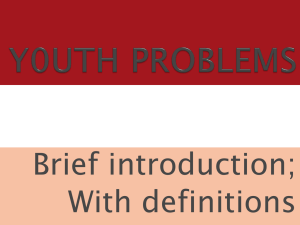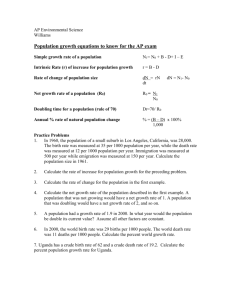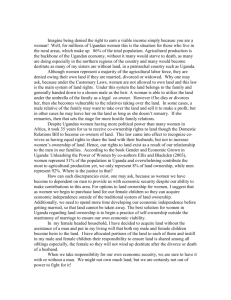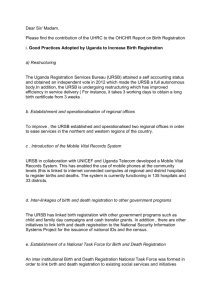The Dakar Summit on Higher Education in Africa: Three
advertisement
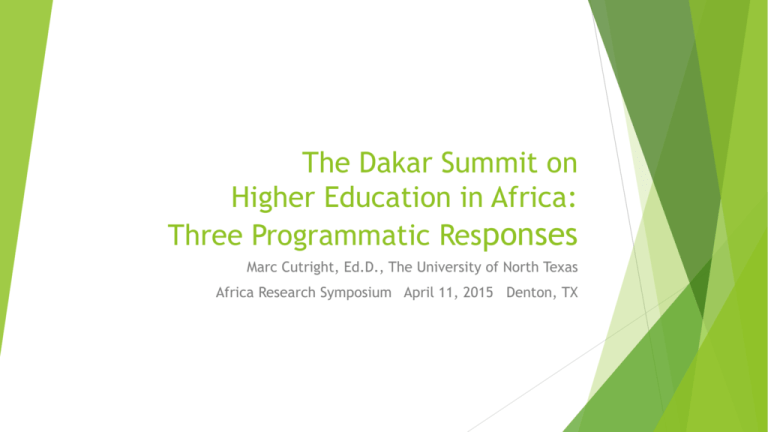
The Dakar Summit on Higher Education in Africa: Three Programmatic Responses Marc Cutright, Ed.D., The University of North Texas Africa Research Symposium April 11, 2015 Denton, TX The African Higher Education Summit on Revitalizing Higher Education for Africa’s Future Organized by Senegal, held in Dakar, March 10-12, 2015 More than 500 vice chancellors, government policy makers, funders, scholars, and others from through the continent Have issued a draft resolution and plan A time frame of 50 years on some objectives, e.g. 50% participation in higher education by mid-century 2 The context of my interest I have worked with colleagues in East Africa on plans to expand access to and to enhance the quality of higher education, particularly in the East African Community (Uganda, Tanzania, Kenya, Rwanda, Burundi) Hosted 8 East African HE leaders at UNT in 2009 2013-2014 Fulbright Scholar to Uganda, attached to Uganda Martyrs University. Some successes with HE administration curricula at the Uganda Management Institute, the establishment of a “work college” in Uganda, and 13 quasicommunity colleges in Tanzania. 3 Three responses to Dakar 1. A plan to more rapidly produce PhDs in key fields and disciplines, and to strengthen African institutional capacity to sustain. 2. Facilitating knowledge about and the establishment of community colleges 3. Facilitating knowledge about and the establishment of Americanmodeled work colleges 4 Reponse 1: More PhDs A current model: Send promising scholars abroad to get PhDs. Problems: Expensive Production cannot meet expanding demand Issues of non-return Gender discrimination Non-strategic as to disciplines Capacity for PhD production by African universities unchanged to a large degree 5 Response 1, continued An alternative: Partner African universities with South African, European, North American universities with disciplinary excellence in key fields. Fund their collaboration of cohort-based, blended delivery PhD programs Take in 20 students per cohort. Aim to complete 75% in about 4 years A cost-contained central authority to select universities and approve or create partnerships, exercise financial oversight, monitor quality, and disseminate results. The arithmetic: 10 centers, 20 students per, 75% completion, 3 such cycles: Equals 450 PhDs in about 10-12 years. Cost: $US15+millon. 6 Response 2: Community Colleges Bring a manageable group of national educators and policy members to the US to examine the community college model in all its varieties. Send a smaller group of CC experts to the nation, to examine on-the-ground contexts, challenges, needs, etc. Aim to issue a joint paper of findings and recommendations on establishing CCs, as feeders to universities, providers of certified or lower degreed quasiprofessional graduates, or providers of adult continuing education—or all three. As a result of 2009 trip here, Saint Augustine University of Tanzania has established 13 campuses on the CC model. Cost: $50,000 to $250,000, depending on design and duration 7 Response 3: Work Colleges Largely a 19th Century American design. Students exchange college labor for reduced or free tuition. 7 remaining in the US: Blackburn (IL), Ecclesia (MO), College of the Ozarks (MO), Berea (KY), Alice Lloyd (KY), Warren Wilson (NC), Sterling (VT). Paul Quinn College, of Dallas, is converting to WC Not vocational education. E.g., a philosophy student milks cows. Many of the social, economic, geographic, and other needs present in 19th Century America are present in sub-Saharan Africa today Uganda Martyrs University has established a work college near Lira. Same development/feasibility plan as CC’s 8 Available here A somewhat more detailed plan on the PhD production model, disseminated at Dakar by: Professor Venansius Barymureeba, Vice Chancellor of Uganda Technology and Management University, former VC of Makerere University, Chair of the Council of Vice Chancellors of Uganda Meaza Demissie of CRDF Global. “CRDF Global is an independent nonprofit organization that promotes international scientific and technical collaboration through grants, technical resources, training and services.” Likely the fiscal agency. A first effort to secure funding 9 Contact Marc Cutright, EdD Associate Professor of Higher Education, University of North Texas Marc.Cutright@unt.edu 10



